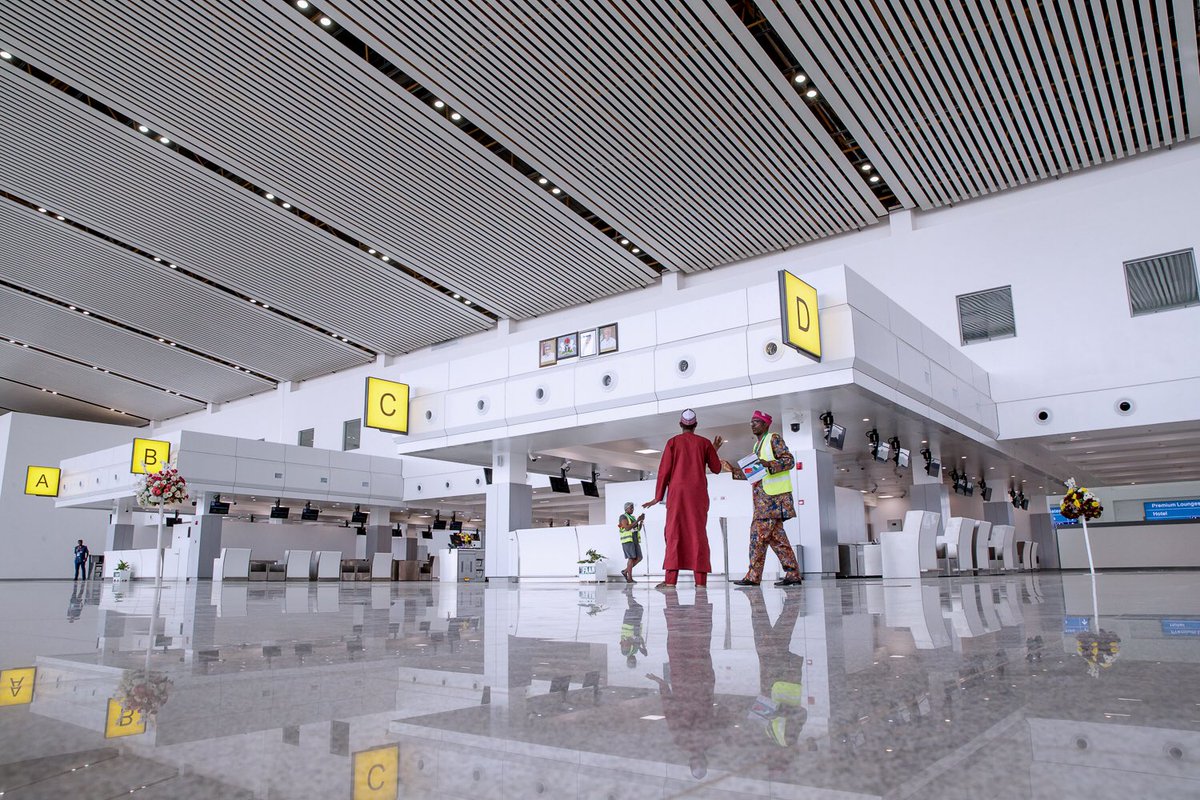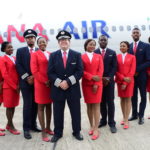
The coronavirus killed over a million people globally, devastated many sectors in economies and literally castrated the aviation sector.
S hortly before the lockdown around March 2020, South Africa Airways stopped its daily operations to Nigeria and thus ended direct commercial flight between two Africa’s largest economies. Globally the world economy has been devastated by the coronavirus pandemic, which spread to the world from Wuhan, China, in February 2020, forcing most part of the world to go on lockdown to control the spread of the disease. Every sector of the economy has had its huge losses, but the most tragic were the deaths of over a million people worldwide. Today the living have to content with crippled economy, the threat of more deaths from the virus and a world made lame by a disease that would haunt mankind for a long time, after it has disappeared. Its devastating effect will be etched in history.
Global Impact Coronavirus pandemic is an international disease that affected every part of globe so the impact was everywhere, but every country has its own peculiar experience. Also in the aviation industry, which is also global, every country is affected, but every country also has its own peculiar experience. In November the International Air Travel Association (IATA) reported that the aviation industry would lose about $118 billion by the end of 2020. But there are indications that by the end of the first quarter of 2021, the industry might lose over $150 billion as the second phase of COVID-19 has forced governments to make further adjustments to control the spread, which may include further restrictions in air travel. IATA had explained that on November 24, 2020, it issued an economic performance report of the airline industry, indicating that losses were set to worsen. It said the industry body predicted that airlines were set to finish 2020 with $118 billion of losses.
“In July 2020, IATA indicated that the industry was forecast to lose $84.3 billion in 2020. However, all is not doom-and-gloom, as the association predicted that losses could be cut to $38 billion in 2021. “With passenger traffic dropping significantly, revenues are estimated to fall by 66 per cent in 2020, which is the largest decline since the Second World War. Throughout the year an estimated $347 billion will be spent by tourists traveling by air, which is 59 per cent less than in 2019. In 2021, the tourist spending should increase to $559 billion and come back to the levels last seen since 2012,” the global body said. IATA also reported that aircraft manufacturers are predicted to complete the delivery of 800 new aircraft before the end of the year, which is approximately half of all, planned deliveries at the beginning of 2020. “IATA predicts that in 2021, airlines will take delivery of 1302 new aircraft, which is close to the numbers of 2019. Nevertheless, more delivery delays and order cancellations are to be expected, as the demand will continue to recover slowly.
Job Losses In terms of job losses, IATA stated that Africa lost about 4.5 million jobs to the pandemic and explained that a total of 5 million African jobs would be lost in aviation and industries supported by aviation in 2020, which is well over half of the region’s 7.7 million aviation-related employment. Also the GDP supported by aviation in the region would fall by up to $37 billion, which is 58 per cent below pre COVID-19 levels. “The breakdown in air connectivity in Africa has severe social and economic consequences for millions. No income means the lack of a social safety net for many. Governments need to do all they can to reconnect the continent safely. Keeping borders closed, or imposing measures such as quarantines, that deter air travel, will result in many more livelihoods being lost and further economic shrinkage along with hardship and poverty,” said IATA’s Regional Vice President for Africa and the Middle East, Muhammad Albakri.
Nigeria’s Peculiar Challenge In Nigeria COVID-19 literally devoured the finances of domestic airlines and aviation agencies to the extent that the agencies at a time, especially during the lockdown, found it difficult to pay their personnel and airlines had to lay off some of their staff, put some in redundancy and cut their salaries by substantial percentage. The airlines were losing money while they were not generating revenue because the aircraft they put on storage had to be maintained, they had to also sustain their overheads and spent money in training their staff on how to abide by the Coronavirus protocols, acquisition of COVID-19 preventive materials and adjustment of their operations and interior of their airplanes to become COVID-19 compliant. The agencies, especially the Federal Airports Authority of Nigeria (FAAN) spent huge resources to deploy materials and equipment to make the airports compliant with new International Civil Aviation Organisation (ICAO) conditions to ensure that travellers do not contract the virus through air travel. The Regional Terminal Manager, South West in charge of the Murtala Muhammed International Airport (MMIA), Mrs. Victoria Shin-aba, told THISDAY that the federal government spent huge resources to make the airports compliant to COVID-19 protocols despite the fact that there was lockdown so the facilities were not generating money. “The expenses bore a big hole in the finances of the authority because as much as the airport was operationally closed, we were working, the facilities were being manned, because it was better to man and maintain than leave them.
“This is because if they were abandoned without maintaining them by the time you come back, they will be worse off. So, it was like needing more money when money was not coming in and it became like inversely proportional. And we had to go the extra length to put so many things in place so that the airport can be COVID-19 complaint. “That is; people will feel safe using the airport. So extra facilities have to be done, like the toilets, we had to change most of the toilets, the taps to COVID-19 complaint, that is, touch-less, we had to get sanitising stations, automatic hand wash, we had to do the markings. So many things went into it, by and large, I want to say we have pulled through not financially but at least the airport is doing well,” Shin-aba said. COVID-19, #ENDSARS, Recession What exacerbated the challenge of Nigerian airlines and the aviation agencies was that while the airlines were trying to recover from the devastating effect of the pandemic, the economy slumped into another recession and youths in Nigeria launched protest that strangled the economy further. This disrupted domestic flights and was followed by hoodlums’ organised violence that ripped of the country and let to death of many. This had another adverse effect of airline operation, as huge revenue was lost by the operators. CEO of Aero Contractors, Captain Ado Sanusi told THISDAY that airlines were facing worse problems with the economic recession because they have not recovered from the COVID-19 lockdown and #endSARS protest, which negatively affected flight operations. He noted with the current recession, airlines would find it difficult to survive and some may even go under “The recession will affect every part of the economy. Prices of local commodities and services are already high so you can imagine the cost of imported goods. Aviation has multiplier effect. Everything we do in aviation has forex component. “That is why airlines are struggling. The Senate Committee Chairman, Senator Smart Adeyemi stated that the airlines are facing dismal situation and this could be solved if government intervenes with bailout. “It is not that planes will drop from the sky. That cannot happen because the industry is effectively regulated, but airlines may be forced to shut down if they do not have the funds to continue operation. I am sure the economic recovery team will pay critical attention to the aviation sector,” Sanusi said. He said Nigerian airlines would have to pay higher insurance premium and this would dig deeper into their funds and this would be a big challenge to the operators, noting that insurance premium is higher in Nigeria because revenues are earned in the naira, which is very cheap now, so airlines would sell their naira to get dollars, which is currently very scarce. “Airlines are still recovering from the impact of COVID-19 lockdown, #endSARS and now economic recession. This will leave a huge toll on the airlines. More airlines may go under. We are paying more for insurance. We will pay more for aircraft leasing. Anything you want to do that has dollar component will be a challenge, even if it is national carrier you wish to establish. So we must have to address the foreign exchange problem,” Sanusi said.
Forex Scarcity As Sanusi noted, as the value of the naira depreciated against the dollar, it became more difficult for airlines to efficiently fund their operations, acquire parts, maintain their aircraft, train their technical personnel and insure their aircraft. He also noted that forex was also responsible for the failure of some airlines to bring back their aircraft ferried overseas for maintenance because as they generate revenue in naira and pay for maintenance in dollars, it has becomes difficult to raise huge amounts in dollars to pay for aircraft maintenance overseas. The consequence for this, he stated, was that there would continue to be inadequate operating aircraft in 2021, which means that airfares would continue to rise, as fewer aircraft would be operating; therefore, demand would always exceed supply.
Bailout It has been reiterated that Nigerian airlines would need a bailout, which other countries have used to save their airlines after the impact of the Coronavirus pandemic. But the federal government announced that it had approved only N4 billion for the airlines and other companies in the sector. This is way lower than what government planned to disburse to the sector earlier, which was N27 billion. In relation to the dollar, this is a very negligible amount of money compared to the huge investment and cost in running airlines. This was the argument made by the Managing Director for Flight and Logistics Solutions Limited, Mr. Amos Akpan, who insisted in a recent article that airlines must be supported by government for them to survive. “Government may not be expected to give cash to the airlines. These are the ways government can support the airlines: give guarantees on aircraft insurance premiums; use bonds to secure payments through Nigerian brokers; extend repayment period on existing loan facilities; restructure new loans to maximum 5 per cent interest; repayment period of 7 to 10 years. “Other ways government can support the airlines include: exempt them from payment of VAT; unify and gazette the implementation of duty exemption on aircraft and aircraft spares; stop granting multiple entry points to foreign airlines and give diplomatic support to Nigerian airlines designated on international routes,” he said. The year 2020 has been identified as the worst since after World War 2 in the aviation industry. 2020 left the sector battered and it desperately needs government support in order to survive.
THISDAY






